|
Books Should Be Free Loyal Books Free Public Domain Audiobooks & eBook Downloads |
|
|
Books Should Be Free Loyal Books Free Public Domain Audiobooks & eBook Downloads |
|
Essay/Short Nonfiction |
|---|
|
Book type:
Sort by:
View by:
|
By: George Morang (1866-1937) | |
|---|---|
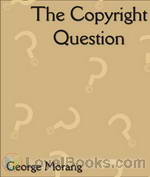 The Copyright Question
The Copyright Question
This is a letter to the Toronto Board of Trade regarding Canadian copyrights. Morang requested an appearance before the Toronto Board of Trade but was denied. This is his letter in response. He wished to make clear his position. | |
By: George Washburn Smalley (1833-1916) | |
|---|---|
 Anglo-American Memories
Anglo-American Memories
“These Memories [1911] were written in the first instance for Americans and have appeared week by week each Sunday in the New York Tribune…. they are mainly concerned with men of exceptional mark and position in America and Europe whom I have met, and with events of which I had some personal knowledge. There is no attempt at a consecutive story.” Smalley was an American journalist born in Massachusetts in 1833; he wrote from and about many places in America and Europe. - Summary by Book Preface and David Wales | |
By: George Wharton James (1858-1923) | |
|---|---|
 What the White Race May Learn from the Indian
What the White Race May Learn from the Indian
People learn from other people, and races have forever learned from other races. Herein we are treated to an in-depth understanding of categorized social characteristics of the Native American peoples, primarily those of the western U.S. as they existed at the time of book publication . 'In dealing with [the Native Americans] as a race, a people, therefore, I do as I would with my own race, I take what to me seem to be racial characteristics, or in other words, the things that are manifested in the lives of the best men and women, and which seem to represent their habitual aims, ambitions, and desires.' - Summary by Roger Melin & book foreword | |
By: Giles Lytton Strachey (1880-1932) | |
|---|---|
 Eminent Victorians
Eminent Victorians
On Modern Library's list of 100 Best Non-Fiction books, "Eminent Victorians" marked an epoch in the art of biography; it also helped to crack the old myths of high Victorianism and to usher in a new spirit by which chauvinism, hypocrisy and the stiff upper lip were debunked. In it, Strachey cleverly exposes the self-seeking ambitions of Cardinal Manning and the manipulative, neurotic Florence Nightingale; and in his essays on Dr Arnold and General Gordon, his quarries are not only his subjects but also the public-school system and the whole structure of nineteenth-century liberal values. | |
By: Goldsworthy Lowes Dickinson (1862-1932) | |
|---|---|
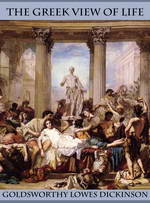 The Greek View of Life
The Greek View of Life
“With the Greek civilisation beauty perished from the world. Never again has it been possible for man to believe that harmony is in fact the truth of all existence.”This elegantly-written work provides a splendid introduction to the Greeks of the classic period: how they thought, wrote, and organised their lives and loves. Although it dates from the 1890s, there is very little about it that has dated. To its author’s credit, the subject of “Greek love” is dealt with in a sane and factual context - despite the judicial assassination of Oscar Wilde going on in the background... | |
By: Grant Allen (1848-1899) | |
|---|---|
 Post-Prandial Philosophy
Post-Prandial Philosophy
| |
By: Grenville Kleiser (1868-1953) | |
|---|---|
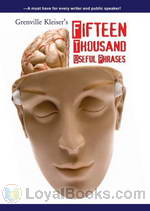 Fifteen Thousand Useful Phrases
Fifteen Thousand Useful Phrases
Fifteen Thousand Useful Phrases is a practical handbook written by Grenville Kleiser. Grenville is known for his writings on humor, positive thinking and inspirational thought. This serves as a handbook of pertinent expressions, striking similes and terms for embellishing speech and literature. This book can be used to improve vocabulary for reading, writing and speaking alike. Through mastery of words, the most powerful and perfect expression of thought can be delivered orally. Choosing the correct words conveys ideas in a crisp and clear way that will hold and audience's attention... | |
By: H. Bolingbroke Mudie (1880-1916) | |
|---|---|
 The Esperantist, Vol. 1, No. 1
The Esperantist, Vol. 1, No. 1
| |
 The Esperantist, Vol. 1, No. 4
The Esperantist, Vol. 1, No. 4
| |
 The Esperantist, Vol. 1, No. 3
The Esperantist, Vol. 1, No. 3
| |
 The Esperantist, Vol. 1, No. 5
The Esperantist, Vol. 1, No. 5
| |
 The Esperantist, Vol. 1, No. 2
The Esperantist, Vol. 1, No. 2
| |
By: H. G. Wells (1866-1946) | |
|---|---|
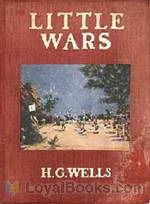 Little Wars (A Game for Boys)
Little Wars (A Game for Boys)
Miniature wargaming got its start with the publication in 1913 of this thoroughly entertaining little account of how H.G. Wells, with certain of his friends, took their childhood toys and turned play into acceptable middle-aged sport by subjecting the exercise to the civilizing influence of actual rules. While wargaming progressed far past these beginnings, Wells observes how “little wars” with even his elementary rules can suggest the wholesale crudity of the real thing. “You have only to play at Little Wars three or four times to realise just what a blundering thing Great War must be... | |
By: H. L. Mencken (1880-1956) | |
|---|---|
 Prejudices, First Series
Prejudices, First Series
Mencken sharpens his pen and in a collection of short essays delivers acerbic opinions on issues and persons of the time. Among his targets in this volume are critics, H.G. Wells Thorstein Veblen, Arnold Bennett, William Dean Howells, Irvin S. Cobb. Mencken's critiques are delivered against a background of his own well known ethnic, racial, religious, and sectional prejudices. Not for the faint of heart, Mencken's prickly, yet unapologetic, prose reveals a window into American attitudes at the time they were written and their influences on the larger American culture. - Summary by DrPGould | |
By: H. M. (Henry Major) Tomlinson (1873-1958) | |
|---|---|
 Old Junk
Old Junk
| |
By: Hamilton Wright Mabie (1846-1916) | |
|---|---|
 Essays on Work and Culture
Essays on Work and Culture
The author investigates the world of work against a backdrop of culture. Each of the 25 essays focuses on one aspect of the topic. For example, the first essay, "Tool or Man?" looks at two views of man. One is that of strength as the provider of security. The other is that of aesthete, as an enthusiast of the arts or academics or religion. In our culture, provider of security is the winner every time. Man as a source of multiple talents cannot be allowed. As the author frames the argument, "Specialisation has been carried so far that it has become an organised tyranny... | |
 Under the Trees and Elsewhere
Under the Trees and Elsewhere
| |
By: Hannah More (1745-1833) | |
|---|---|
 Essays on Various Subjects Principally Designed for Young Ladies
Essays on Various Subjects Principally Designed for Young Ladies
| |
By: Harl Vincent (1893-1968) | |
|---|---|
 Astounding Stories 02, February 1930
Astounding Stories 02, February 1930
This is the second issue of the classic science fiction Astounding Magazine. It contains the finale of The Beetle Horde by Victor Rousseau, as well as stories by Harl Vincent, Charles Willard Diffin, Hugh B. Cave, Sophie Wenzel Ellis, Sterner St. Paul, Anthony Pelcher and Captain S. P. Meek. | |
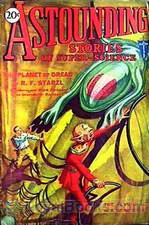 Astounding Stories 08, August 1930
Astounding Stories 08, August 1930
Issue eight of this seminal science-fiction magazine CONTENTS Murder Madness by Murray Leinster - the conclusion of this novel Earth the Maurader by Arthur J. Burks - Part 2 of a 3 Part novel as well as short Stories The Planet of Dread by R.F. Starxl, The Lord of Space by Victor Rousseau, The Second Satellite by Edmund Hamilton, Silver Dome by Harl Vincent and The Flying City by H. Thompson Rich | |
 Astounding Stories 10, October 1930
Astounding Stories 10, October 1930
Issue no. 10 of the magazine brings you:- Stolen Brains by Captain S.P. MeekThe Invisible Death by Victor Rousseau Prisoners on the Electron by Robert H. Leitfred Part 2 of Jetta of the Lowlands by Ray Cummings An Extra Man by Jackson Gee along with the Readers' Corner and interesting scientific facts | |
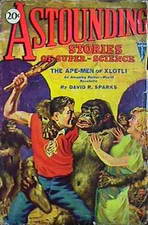 Astounding Stories 12, December 1930
Astounding Stories 12, December 1930
This issue includes "Slaves of the Dust" by Sophie Wenzel Ellis, Part B of "The Pirate Planet" by Charles W. Diffin, "The Sea Terror" by Captain S. P. Meek, "Gray Denim" by Harl Vincent, and "The Ape-Men of Xlotli" by David R. Sparks. | |
By: Harriet S. Caswell (1834-) | |
|---|---|
 Stories and Sketches
Stories and Sketches
| |
By: Harry Bates, Editor | |
|---|---|
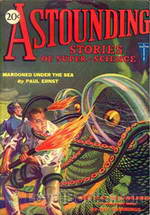 Astounding Stories of Super-Science, September 1930
Astounding Stories of Super-Science, September 1930
This is a collection of short science fiction stories by various writers, circa 1930. Writers include Paul Ernst, Miles Breuer, Ray Cummings, Sewell Wright, and others. | |
By: Helen Keller (1880-1968) | |
|---|---|
 The World I Live In
The World I Live In
The World I Live In by Helen Keller is a collection of essays that poignantly tells of her impressions of the world, through her sense of touch, smell, her imagination and dreams. My hand is to me what your hearing and sight together are to you. In large measure we travel the same highways, read the same books, speak the same language, yet our experiences are different. All my comings and goings turn on the hand as on a pivot. It is the hand that binds me to the world of men and women. The hand is my feeler with which I reach through isolation and darkness and seize every pleasure, every activity that my fingers encounter... | |
By: Henry David Thoreau (1817-1862) | |
|---|---|
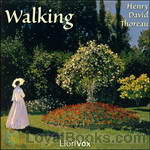 Walking
Walking
This was originally a lecture given by Thoreau in 1851 at the Concord lyceum titled “The Wild” . He revised it before his death and it was included as part of the June 1862 edition of Atlantic Monthly. This essay appears, on the surface, to be simply expounding the qualities of Nature and man’s place therein. Through this medium he not only touches those subjects, but with the implications of such a respect for nature, or lack thereof. | |
By: Henry L. Mencken | |
|---|---|
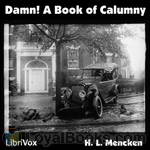 Damn! A Book of Calumny
Damn! A Book of Calumny
Henry Louis “H. L.” Mencken (1880 – 1956) was an American journalist, essayist, magazine editor, satirist, acerbic critic of American life and culture, and a student of American English. Known as the “Sage of Baltimore”, he is regarded as one of the most influential American writers and prose stylists of the first half of the 20th century. Mencken is perhaps best remembered today for The American Language, a multi-volume study of how the English language is spoken in the United States, and for his satirical reporting on the Scopes trial, which he named the “Monkey” trial.” | |
By: Henry Van Dyke (1852-1933) | |
|---|---|
 Little Rivers; a book of essays in profitable idleness
Little Rivers; a book of essays in profitable idleness
| |
 Days Off And Other Digressions
Days Off And Other Digressions
| |
By: Henry W. Lucy (1845-1924) | |
|---|---|
 Faces and Places
Faces and Places
Faces and Places is a collection of articles on nineteenth century travel, events and personalities by the British journalist Henry Lucy, who wrote for the Daily News, a London newspaper. His open letter To Those About to Become Journalists rings as true today as when it was written.The first article, “Fred” Burnaby, includes a lively account of a balloon trip, while Night and Day on the Cars in Canada and Easter on Les Avants relate Lucy’s experiences of rail travel at that time. Other travel tales (A Night on a Mountain, Mosquitoes and Monaco, and Oysters and Arcachon) provide an insight into the Victorian Englishman’s attitude to Europe... | |
By: Herbert W. Collingwood (1857-1927) | |
|---|---|
 Hope Farm Notes
Hope Farm Notes
“Most of these notes were originally printed in the Rural New-Yorker from week to week and covering a period of about 20 years. . . . From the very first the object of these notes has been to picture simply and truthfully the brighter, cheerful side of Farm Life.” Herbert W. Collingwood gives us a delightful collection of essays reflecting his homespun wisdom and wit from the rural setting of the farm in early twentieth century America. He touches on subjects from baseball to Christmas, all reflecting his treasured values of home and family. - Summary by Larry Wilson | |
By: Hilaire Belloc | |
|---|---|
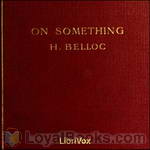 On Something
On Something
“Now that story is a symbol, and tells the truth. We see some one thing in this world, and suddenly it becomes particular and sacramental; a woman and a child, a man at evening, a troop of soldiers; we hear notes of music, we smell the smell that went with a passed time, or we discover after the long night a shaft of light upon the tops of the hills at morning: there is a resurrection, and we are refreshed and renewed.” – Hilaire Belloc | |